- Home
- Quizzes
- My Quiz Activity
- Newsletters
- Sports Betting
- MY FAVORITES
- Add Sports/Teams
- SPORTS
-
NFL
- NFL Home
- Arizona Cardinals
- Atlanta Falcons
- Baltimore Ravens
- Buffalo Bills
- Carolina Panthers
- Chicago Bears
- Cincinnati Bengals
- Cleveland Browns
- Dallas Cowboys
- Denver Broncos
- Detroit Lions
- Green Bay Packers
- Houston Texans
- Indianapolis Colts
- Jacksonville Jaguars
- Kansas City Chiefs
- Las Vegas Raiders
- Los Angeles Chargers
- Los Angeles Rams
- Miami Dolphins
- Minnesota Vikings
- New England Patriots
- New Orleans Saints
- New York Jets
- New York Giants
- Philadelphia Eagles
- Pittsburgh Steelers
- San Francisco 49ers
- Seattle Seahawks
- Tampa Bay Buccaneers
- Tennessee Titans
- Washington Commanders
-
MLB
- MLB Home
- Arizona Diamondbacks
- Atlanta Braves
- Baltimore Orioles
- Boston Red Sox
- Chicago White Sox
- Chicago Cubs
- Cincinnati Reds
- Cleveland Guardians
- Colorado Rockies
- Detroit Tigers
- Houston Astros
- Kansas City Royals
- Los Angeles Angels
- Los Angeles Dodgers
- Miami Marlins
- Milwaukee Brewers
- Minnesota Twins
- New York Yankees
- New York Mets
- Oakland Athletics
- Philadelphia Phillies
- Pittsburgh Pirates
- San Diego Padres
- San Francisco Giants
- Seattle Mariners
- St. Louis Cardinals
- Tampa Bay Rays
- Texas Rangers
- Toronto Blue Jays
- Washington Nationals
-
NBA
- NBA Home
- Atlanta Hawks
- Boston Celtics
- Brooklyn Nets
- Charlotte Hornets
- Chicago Bulls
- Cleveland Cavaliers
- Dallas Mavericks
- Denver Nuggets
- Detroit Pistons
- Golden State Warriors
- Houston Rockets
- Indiana Pacers
- Los Angeles Clippers
- Los Angeles Lakers
- Memphis Grizzlies
- Miami Heat
- Milwaukee Bucks
- Minnesota Timberwolves
- New Orleans Pelicans
- New York Knicks
- Oklahoma City Thunder
- Orlando Magic
- Philadelphia 76ers
- Phoenix Suns
- Portland Trail Blazers
- Sacramento Kings
- San Antonio Spurs
- Toronto Raptors
- Utah Jazz
- Washington Wizards
-
NHL
- NHL Home
- Anaheim Ducks
- Arizona Coyotes
- Boston Bruins
- Buffalo Sabres
- Calgary Flames
- Carolina Hurricanes
- Chicago Blackhawks
- Colorado Avalanche
- Columbus Blue Jackets
- Dallas Stars
- Detroit Red Wings
- Edmonton Oilers
- Florida Panthers
- Los Angeles Kings
- Minnesota Wild
- Montreal Canadiens
- Nashville Predators
- New Jersey Devils
- New York Islanders
- New York Rangers
- Ottawa Senators
- Philadelphia Flyers
- Pittsburgh Penguins
- San Jose Sharks
- Seattle Kraken
- St. Louis Blues
- Tampa Bay Lightning
- Toronto Maple Leafs
- Vancouver Canucks
- Vegas Golden Knights
- Washington Capitals
- Winnipeg Jets
- NCAAF
- NCAAM
- Boxing
- Entertainment
- Lifestyle
- Golf
- MMA
- Soccer
- Tennis
- Wrestling
- More Sports
- RESOURCES
- My Account
- YB on Facebook
- YB on Twitter
- YB on Flipboard
- Contact Us
- Privacy Policy
- Terms of Service
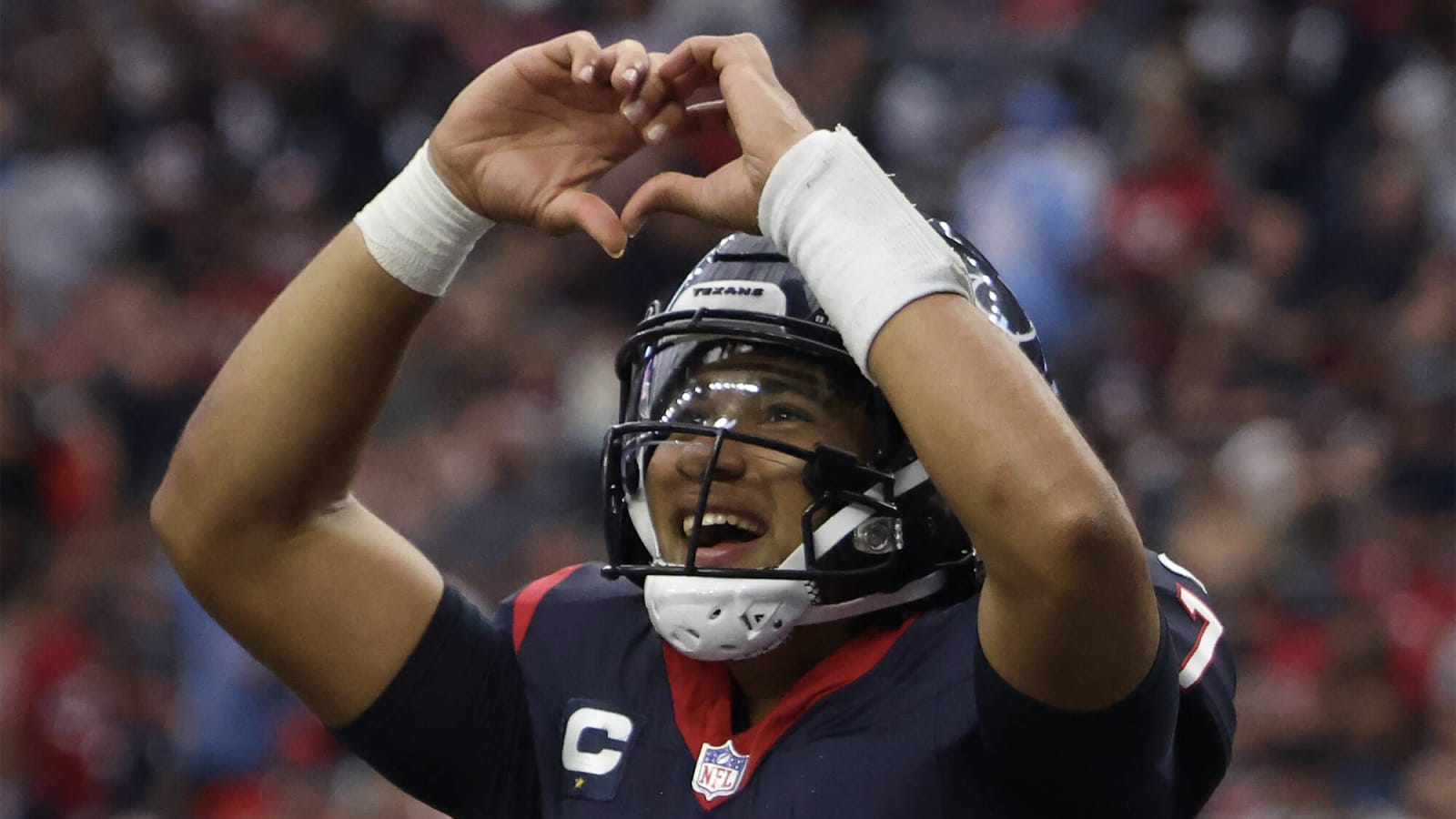
Every NFL Offensive Rookie of the Year winner
In the NFL, rookies are usually asked to hit the ground running. That was truer when rookies came into the league with massive contracts, but it remains true. If a player can emerge as Rookie of the Year, they have effectively paid off already. That said, some rookies go on to great things, while others fall by the wayside. Here is every winner of Offensive Rookie of the Year.
1967: Mel Farr
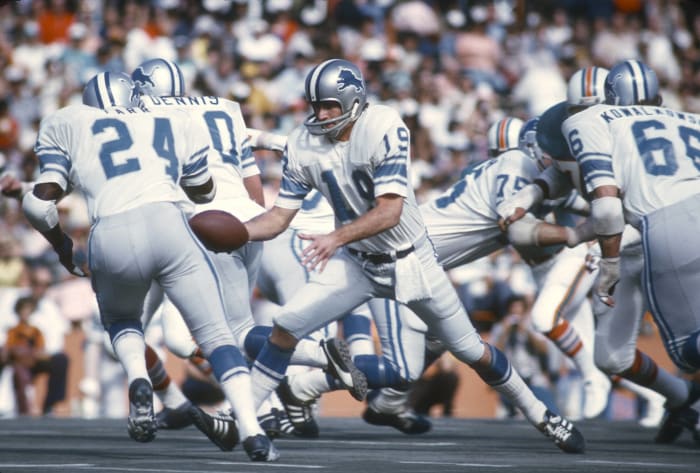
He lacks the fame of Billy Simms or Barry Sanders unless you know your local Detroit ads, but Farr was a good running back for the Lions. In 1967, he ran for 860 yards and led the Lions with 39 receptions. Unfortunately, injuries limited him to all of two healthy seasons in the NFL, both of which saw him make the Pro Bowl. Instead, he became a car dealership and commercial icon in the Motor City.
1968: Earl McCullouch
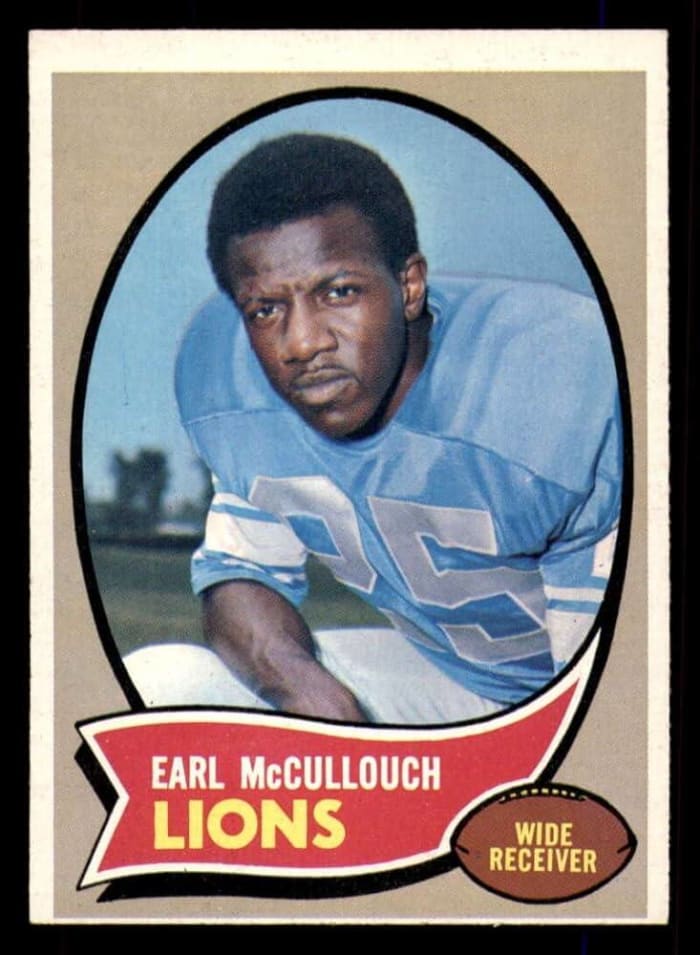
The Lions could pick them, apparently, as they had the first two Offensive Rookie of the Years in NFL history. McCullouch was a great athlete. Like, he held the world record in the 110-meter high hurdles and was part of the record-breaking 4x100 relay team as well. That speed served him decently in the NFL, including his rookie season when he had 40 catches for 680 yards and five touchdowns.
1969: Calvin Hill

In the 1960s, the NFL was still kind of the Wild West. For example, the Dallas Cowboys drafted Hill and didn’t know where he’d play. They thought maybe he’d be a tight end or a linebacker, but then they lost a few running backs, so they tried him there. He ran for 942 yards and eight touchdowns, making the Pro Bowl and being named a First-Team All-Pro. Hill would have two 1,000-yard seasons in his career and make three more Pro Bowls, but he was more of a good, not great, back. Oh, and he's Grant Hill's dad!
1970: Dennis Shaw
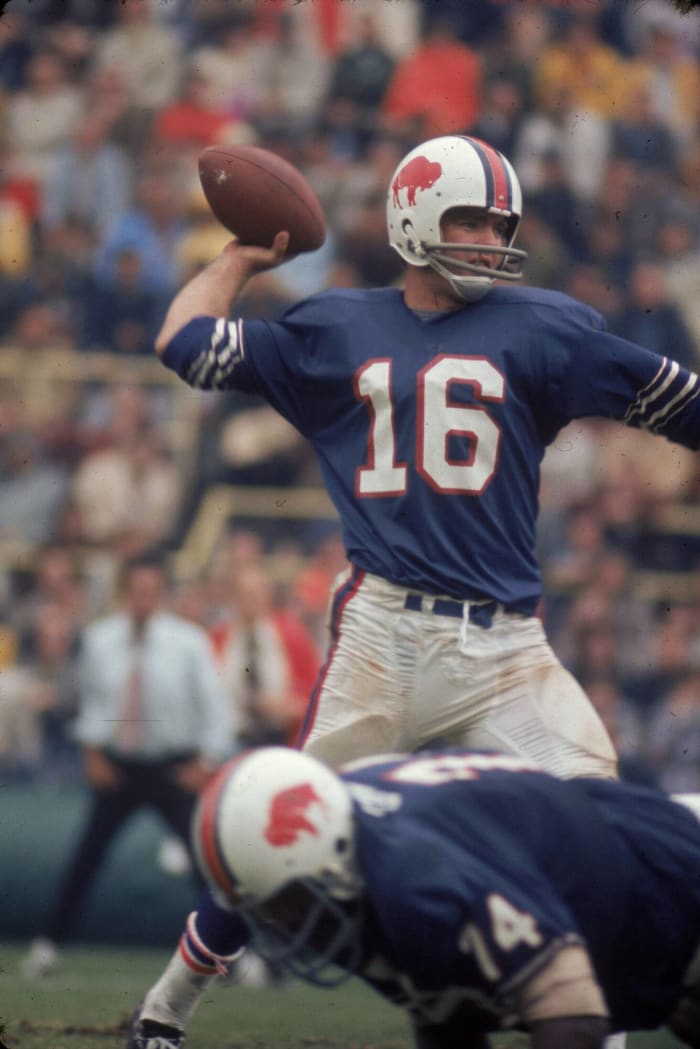
Granted, playing quarterback was different in 1970, and they had to give out an Offensive Rookie of the Year award, but, well, how did Shaw win? Starting 12 games for the Bills, Shaw threw 10 touchdowns…and 20 interceptions. Yes, the Offensive Rookie of the Year in 1970 had twice as many picks as touchdowns. He started two more seasons for the Bills, but Shaw never managed to have more touchdowns than picks.
1971: John Brockington

Brockington is in the Hall of Fame…the Green Bay Packers Hall of Fame. That’s off the strength of his first three seasons, all of which saw him rush for over 1,000 yards. As a rookie, he was a Pro Bowler and an All-Pro, making him an easy choice for OROY.
1972: Franco Harris
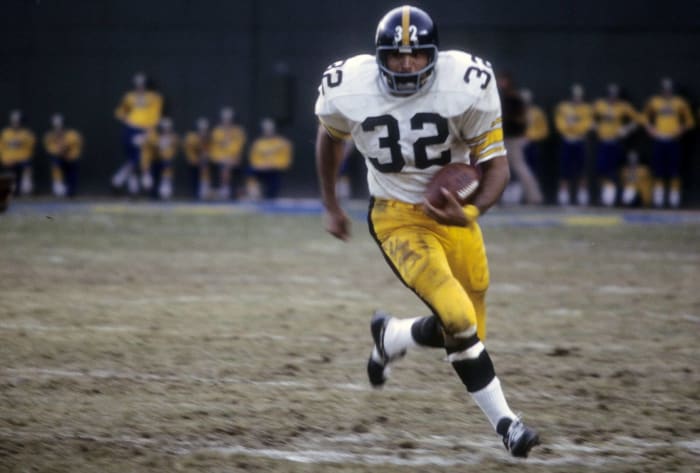
Finally. With all due respect to these first few names, Harris is the first player who pops. He’s the first legend, the first Hall of Famer, and a member of the NFL’s All-1970s team. The Steelers icon ran for 1,055 yards and 10 touchdowns on only 188 carries as a rookie. It was his first of nine straight Pro Bowls.
1973: Chuck Foreman
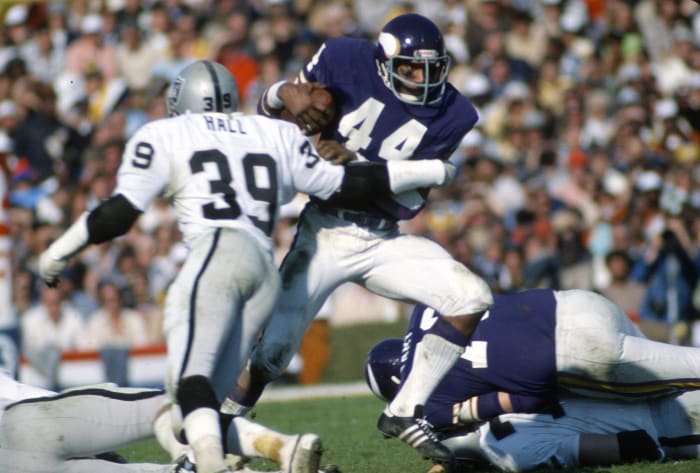
Like many running backs, Foreman had a productive but short career. He made the Pro Bowl in his first five seasons but only had one more season where he saw any real action, and only three more in total. As a rookie for the Vikings, Foreman had 801 yards but added 362 through the air on 37 receptions. Foreman was a predecessor to the likes of Alvin Kamara and Christian McCaffrey, once leading the NFL with 73 catches.
1974: Don Woods
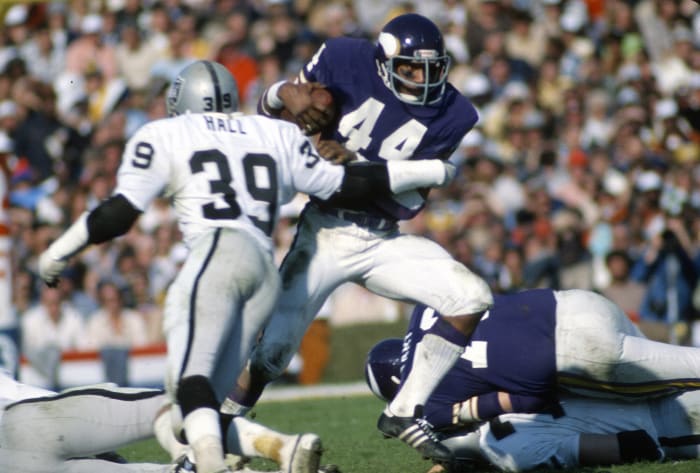
A quarterback in college, the Packers drafted Woods in the fifth round of the 1974 NFL Draft…and then released him. The Chargers picked him up and played him at running back, and it clicked. As a rookie, even though he didn’t play in three games, Woods ran for 1,162 yards with 10 total touchdowns. However, the back proved a flash in the pan, never again rushing for more than 514 yards.
1975: Mike Thomas

The idea of finding productive backs later in the NFL Draft is not some new concept. Woods was a sixth-round pick, and Thomas was a fifth-round pick. He was taken by Washington and ran for 919 yards as a rookie, adding 40 catches for 483 yards. The next season, his only Pro Bowl campaign, is also his only 1,000-yard campaign on the ground, but Thomas actually finished with over 1,000 yards total in each of his four seasons with Washington. Then, he had two forgettable seasons with the Chargers and was out of the league.
1976: Sammy White
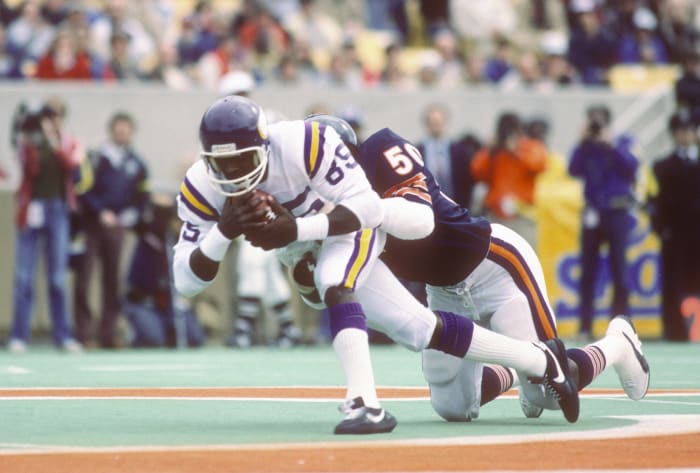
This is a list that has been heavy on running backs, unsurprising for 1960s and 1970s football. White, the Offensive Rookie of the Year in 1976, is only the second wide receiver, and the next several names are rushers, so we wanted to shout him out. In a time before the NFL was pass-happy, White had 51 catches for 906 yards and 10 touchdowns for the Vikings as a rookie. He made the Pro Bowl in each of his first two seasons, his only Pro Bowls, but would later have a 1,000-yard season for Minnesota as well.
1977: Tony Dorsett
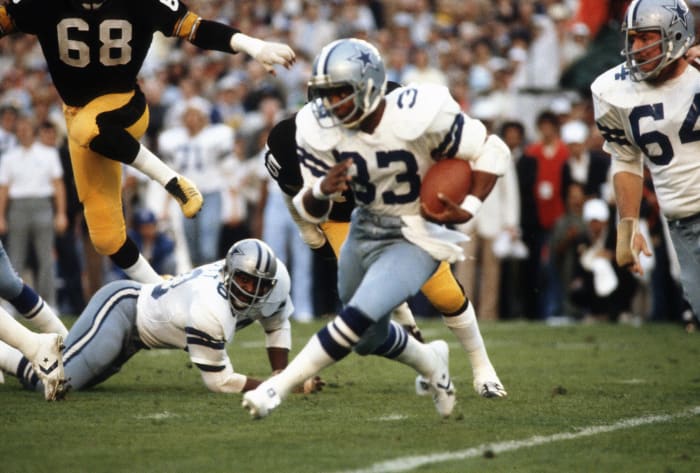
Another Hall of Famer. Not every running back has one or two good seasons before fading. A Heisman winner at Pittsburgh, Dorsett played almost his entire NFL career with the Cowboys. Even though he was technically the backup for most of his rookie year, he ran for 1,007 yards and 12 touchdowns. While he never won an MVP and was only a first-team All-Pro once, Dorsett had eight 1,000-yard seasons and also famously ran for a 99-yard touchdown.
1978: Earl Campbell
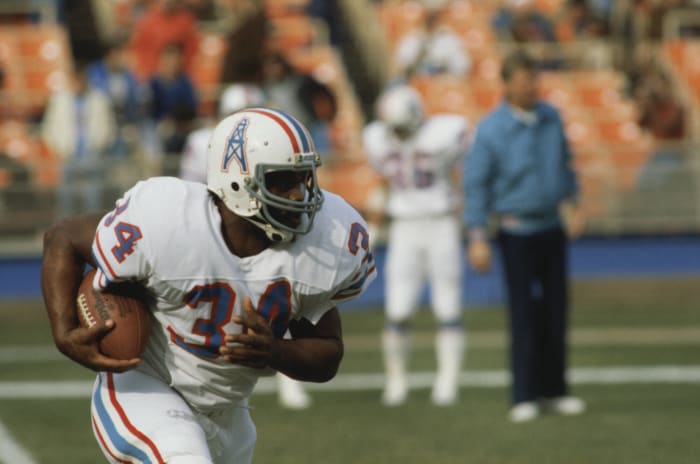
Maybe part of the reason why Dorsett couldn’t rack up as much hardware as one might expect is that Campbell debuted the next year. The Oilers back was worked into the ground, and his body paid the price, but he was as impressive a back as the NFL had seen by the time of his retirement. He won Offensive Rookie of the Year in 1978, yes, but he was also a first-team All-Pro and was Offensive Player of the Year. In fact, in each of the first three seasons of his career, Campbell was first-team All-Pro and Offensive Player of the Year — with an MVP in the mix as well, of course.
1979: Ottis Anderson
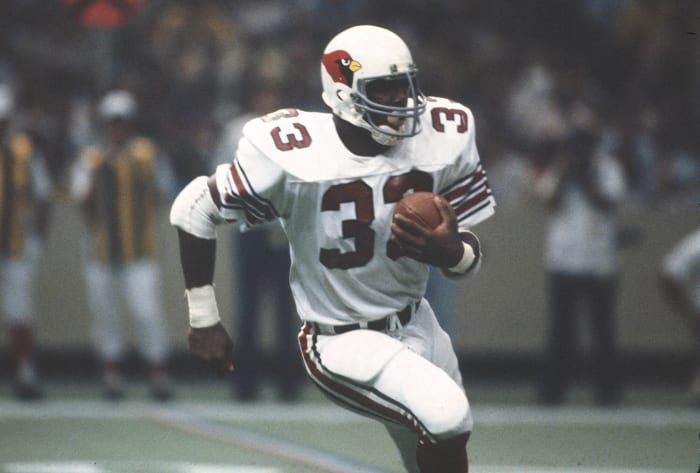
Anderson played as a rookie for the Cardinals…the St. Louis Cardinals, as the franchise was known before moving to the desert. He hit the ground running, as Anderson racked up 193 yards in his NFL debut. That was en route to him tallying 1,605 yards on the ground. While Anderson never quite hit that level again, he had a couple of 1,300-yard seasons with the Cardinals and even put together a 1,000-yard season a decade after his debut, though with the Giants. Owing to so much rushing talent in the NFL at the time, Anderson isn’t in the Hall of Fame, but he is a quintessential “Hall of Very Good” guy.
1980: Billy Sims

The Lions made Sims, a running back out of Oklahoma, the first-overall pick in 1980. It paid off, as he ran for 1,303 yards and 13 touchdowns, adding 51 catches for 621 yards. His second season was just as good, as he racked up 1,437 yards and 13 more scores. Sadly, in 1984, Sims suffered a career-ending knee injury, and instead of becoming the icon of the Lions franchise, that role went to his successor, Barry Sanders.
1981: George Rogers
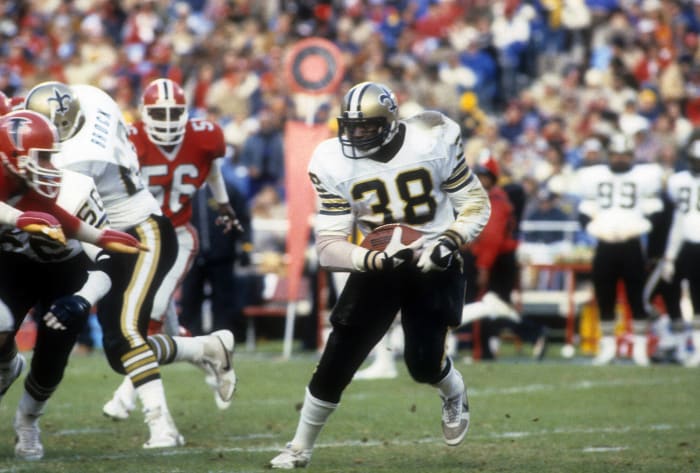
South Carolina is no college football powerhouse, but George Rogers was such a star in college he won the Heisman there and became the first-overall pick in the NFL Draft. Rogers debuted as a force for the Saints, rushing for a whopping 1,674 yards and 13 touchdowns. Unfortunately, in the wake of his rookie season, Rogers testified that he was heavily using cocaine as a rookie and checked himself into rehab in 1982. His other great season in the NFL came in 1986 with Washington, when he ran for 18 touchdowns. While they happened in different seasons, Rogers did lead the NFL in rushing yards and rushing touchdowns once apiece.
1982: Marcus Allen

Allen’s rookie year came in the strike-shortened 1982 season, so he only played nine games for the then-Los Angeles Raiders. He managed 697 rushing yards, solid if unremarkable, but led the NFL with 11 rushing scores. The rushing yards would pick up in time, as he ran for 1,759 yards in 1975, his MVP season. Allen is in the Hall of Fame.
1983: Eric Dickerson
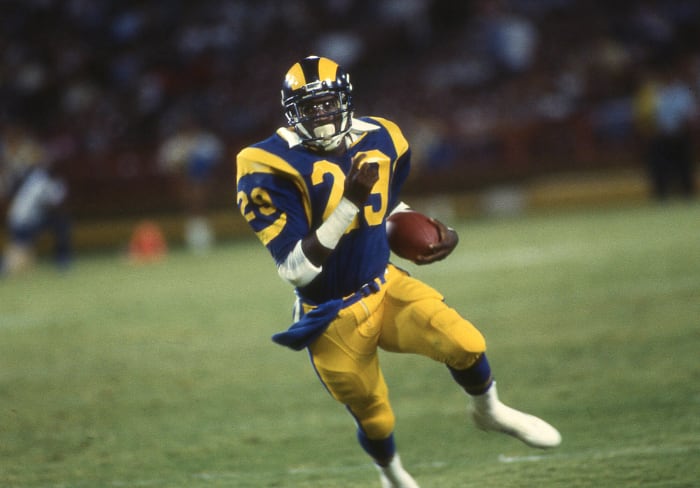
Speaking of Hall of Fame running backs! The iconic season for Dickerson was 1984, his sophomore campaign. That was when he ran for 2,015 yards, still an NFL record. Don’t sleep on his rookie year, though. New to the NFL, Dickerson ran for 1,808 yards to lead the league and scored a whopping 18 rushing touchdowns. Yeah, no wonder he made the Hall.
1984: Louis Lipps
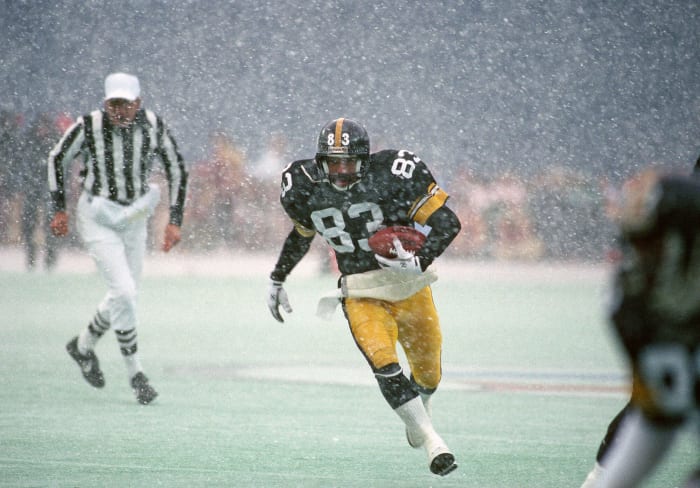
What’s this? Somebody who isn't a running back? Lipps was a wide receiver but was acclaimed for his punt-returning skills. As a rookie, he had 45 catches for 860 yards and nine touchdowns, but he also set a new NFL record with 656 punt return yards. In his second season for the Steelers, he had his best year as a receiver and was a dynamic return man again. After that, Lipps stopped returning kicks by and large but had a couple more solid seasons as a receiver.
1985: Eddie Brown

Another receiver! We’re on a run! Actually, we won’t see another receiver until the 1990s, and Brown won in 1985, but we digress. Brown was the first standout weapon for the Miami Hurricanes — he was on the 1983 title winner — and was a first-round pick of the Bengals. He had 942 yards and eight touchdowns in his first campaign. Though Brown only played seven years in the NFL, all with Cincinnati, he was always a reliable receiver. He only went over 1,000 yards once but had over 700 receiving yards in six of his seven campaigns.
1986: Rueben Mayes
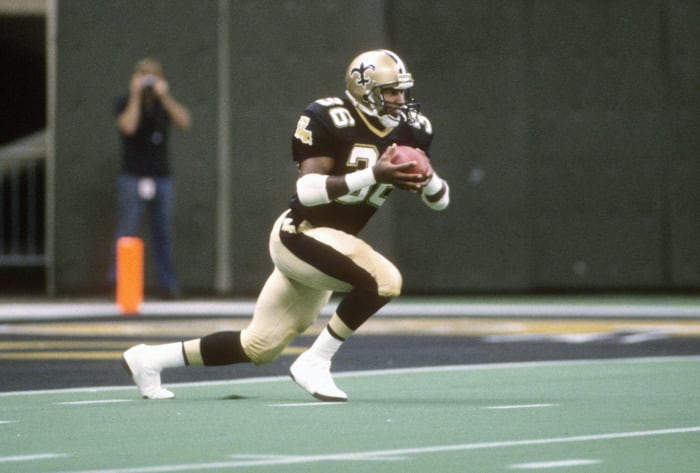
Born in Canada, Mayes was drafted in the third round of the 1986 NFL Draft and second overall in the 1986 CFL Draft. However, the running back decided to stay in America (he played college ball at Washington State) and essentially replace George Rogers for the Saints. He sort of did as a rookie, rushing for 1,353 yards and eight touchdowns. He made the Pro Bowl in his first two seasons but, in a tale as old as time, had a short, injury-riddled NFL career.
1987: Troy Stradford
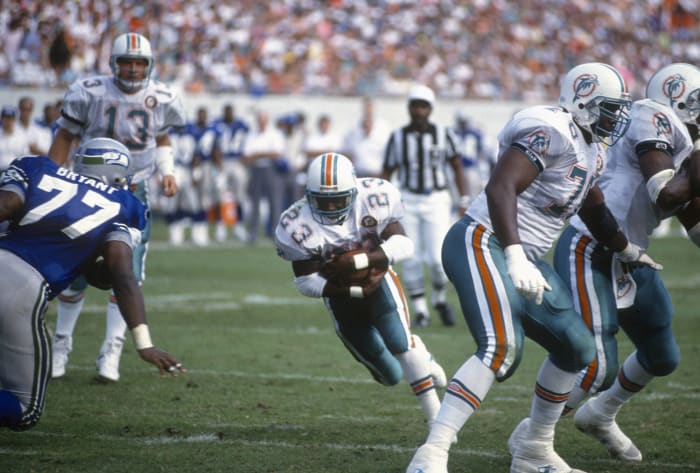
Maybe 1987 was a down year for offensive rookies. Stradford was a running back for the Dolphins, but he only started a handful of games and had a third-down back’s skill set, namely the ability to catch the ball. He only ran for 619 yards with six touchdowns but added 48 catches for 457 yards. It would be his own season getting triple-digit carries, and he only technically started 15 games in his career. Hey, at least he has this award.
1988: John Stephens
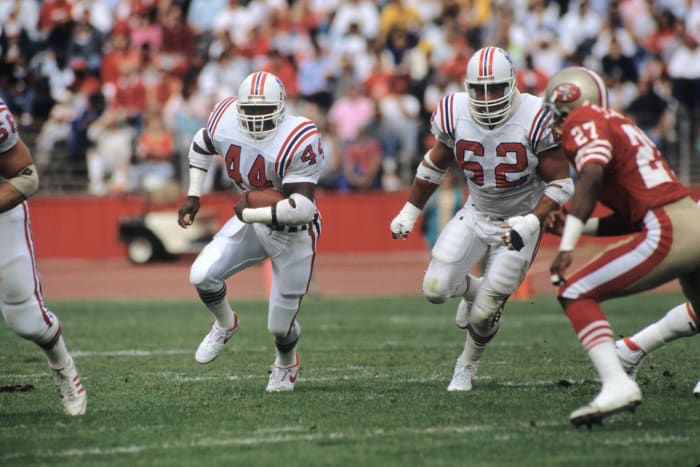
Stephens was a terrible person who only didn’t spend years in prison because he died in a car crash in 2009 at the age of 43. He ran for over 1,000 yards as a rookie with the Patriots. It was his only Pro Bowl season. Who cares?
1989: Barry Sanders
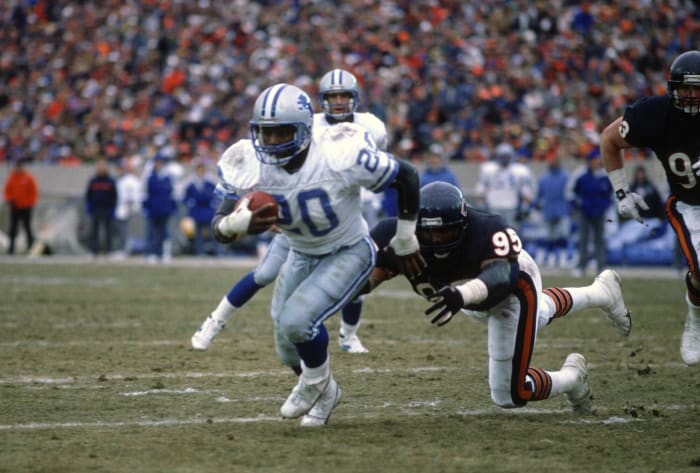
A nice palate cleanser, with Sanders being not just arguably the best running back of all time but also one of the most exciting players to ever watch do his thing. As we noted, Sanders ended up replacing Billy Sims after Sims’ unfortunate career-ending injury. The Lions reloaded and then some. Sanders hit the ground running with 1,470 rushing yards with 14 touchdowns. He was twice the Offensive Player of the Year, once an MVP, and only didn’t become the all-time leading rusher because he called his career short at his behest. This led to some fallout with the Lions franchise, which fortunately has been patched up.
1990: Emmitt Smith
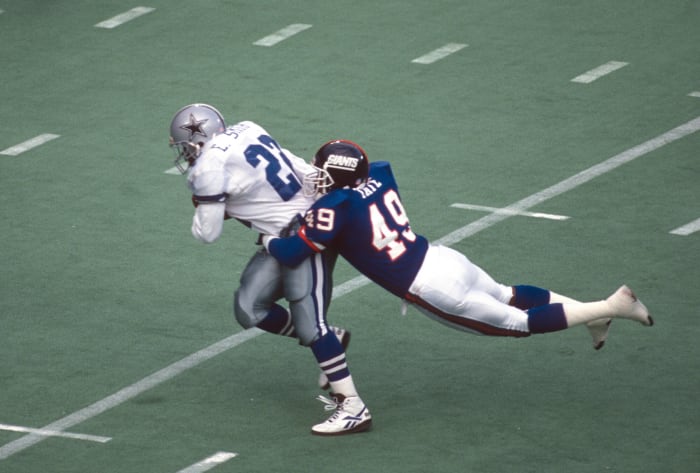
Where Sanders decided to step away, Smith decided to grind out yard after yard until he did manage to retire as the all-time leading rusher, a record that will likely stand the test of time. Plus, Smith also has the Super Bowl rings that Barry never got. The iconic Cowboys back actually didn’t do amazingly as a rookie, rushing for 939 yards at 3.9 yards per carry while fumbling seven times (though losing none of them). However, he would go ahead and lead the NFL in rushing in each of the next three seasons.
1991: Leonard Russell
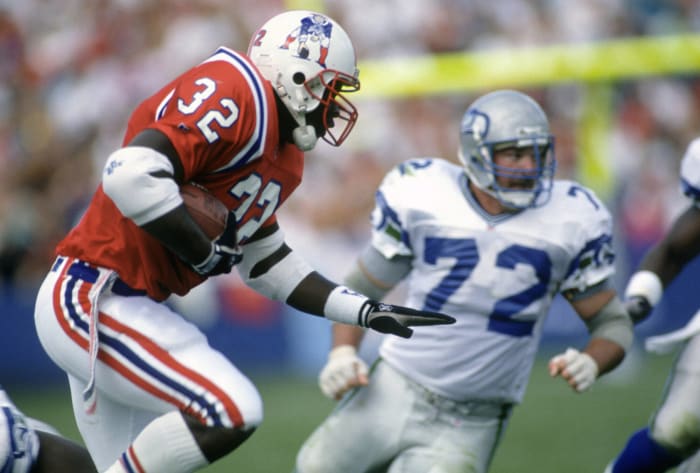
Unfortunately for Russell, the running back is getting mentioned after two of the five best backs to ever do it. He wasn’t quite on that level. The 14th overall pick in 1991 for the Patriots, he ran for 959 yards, though with only four touchdowns. That was enough to get him the Offensive Rookie of the Year award. Russell had one 1,000-yard season when new Pats coach Bill Parcells gave him 300 carries, but that same Parcells traded him prior to the 1994 season, leading to three campaigns with three different teams before Russell retired.
1992: Carl Pickens
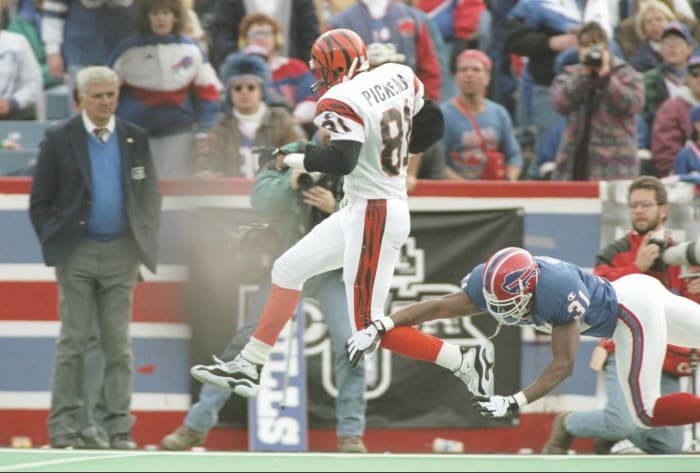
We have ourselves a wide receiver (who will be followed by several more running backs, naturally) in Pickens. Pickens had a few great years for the Bengals and was the franchise’s leader in receiving touchdowns when he retired. In 1995 and 1996, he was a Pro Bowler and second-team All-Pro both times. Back in 1992, though, his special teams production likely played a role in this award. Pickens only had 26 catches for 326 yards and a touchdown, but also had a 95-yard punt return a lot of voters likely remembered.
1993: Jerome Bettis
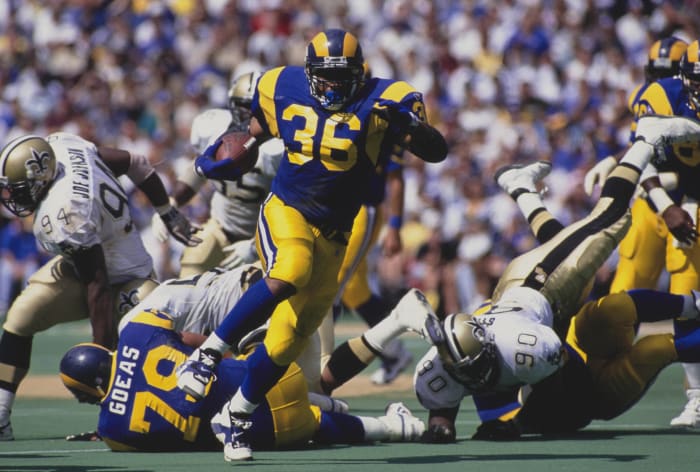
“The Bus” was running over the opposition from the second he took the field for the then-Los Angeles Rams. Bettis was a Pro Bowler and first-team All-Pro thanks to his 1,429 yards and seven rushing touchdowns with 4.9 yards per carry to his name. In 1995, the Rams moved to St. Louis and hired Rich Brooks as their head coach. Brooks didn’t use Bettis as much, and prior to the 1996 season, he asked him if he would be interested in playing fullback. Bettis asked for a trade. He went to Pittsburgh and became a franchise legend and Hall of Famer. Brooks would be fired after the 1996 season and wouldn’t be a head coach again until 2003, when he went back to college to take over the Kentucky Wildcats.
1994: Marshall Faulk
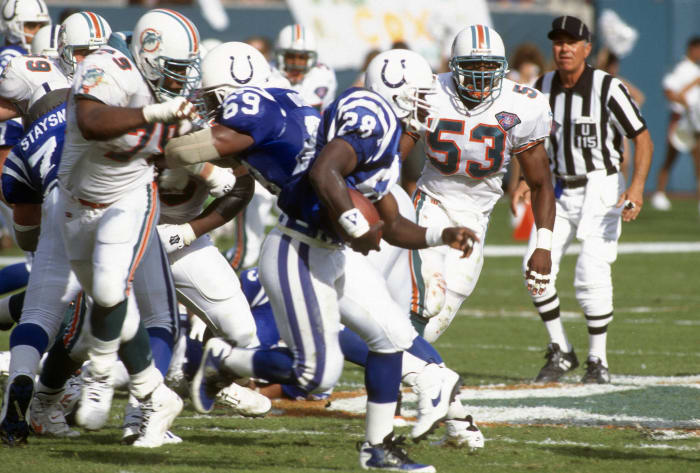
The Rams would, eventually, replace Bettis and do just fine in the process. Before that, though, Faulk was winning Offensive Rookie of the Year with the Colts. One of the best receiving backs ever — maybe the best, full stop — Faulk debuted with 1,282 rushing yards with 11 rushing scores but also 52 catches for 522 yards. Eventually, after three Pro Bowl seasons for the Colts, Faulk moved to the Rams. He proceeded to win Offensive Player of the Year in each of his first three campaigns in St. Louis. Jerome who?
1995: Curtis Martin
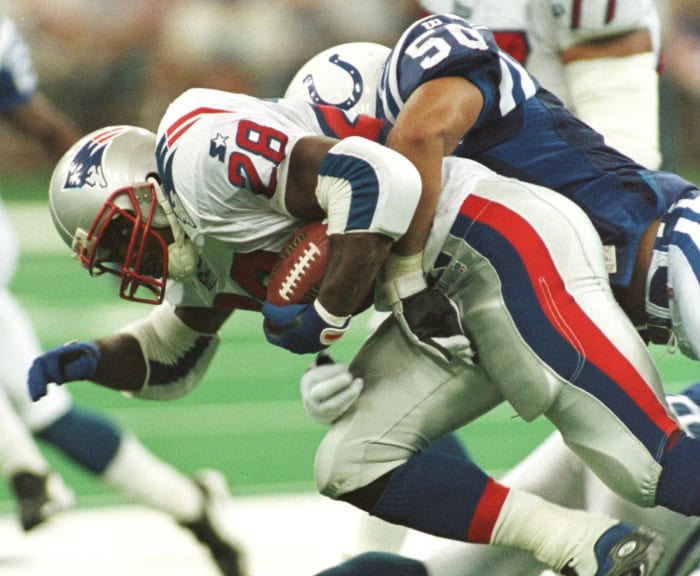
Martin is one of those backs who was really good for a long time, and when you looked up, he had some of the best numbers ever and had locked up a Hall-of-Fame career. He was never MVP and was only a first-team All-Pro once, but he ran for over 1,000 yards in each of his first 10 seasons. That includes in 1995, when the Patriots gave him a whopping 368 carries. He only needed to average 4.0 yards per attempt to rack up 1,487 yards and 14 touchdowns at that rate.
1996: Eddie George
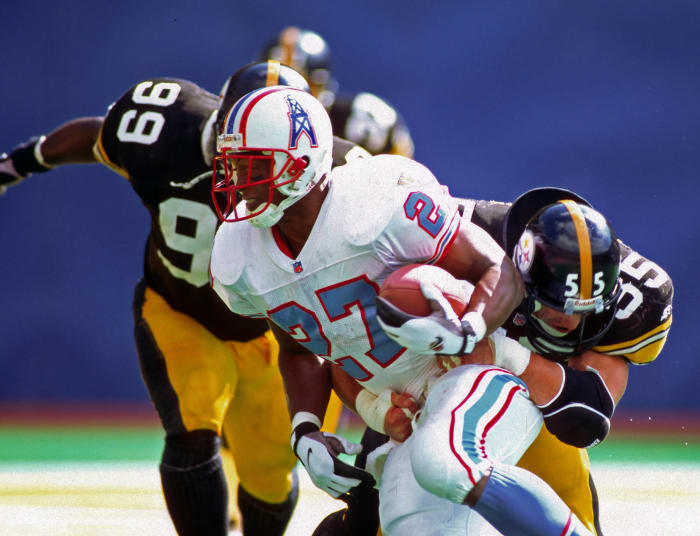
Heisman winner George got one chance to follow in the footsteps of the iconic Earl Campbell. That is to say, his first season was the last season before the Houston Oilers moved to Tennessee. George would have several good seasons with the Titans, but it all started in Houston, where he ran for 1,368 yards with eight scores. Perhaps owing to a relative lack of touchdowns and a propensity to fumble, George isn’t in the Hall of Fame and may end up a headliner in the “Hall of Very Good.”
1997: Warrick Dunn
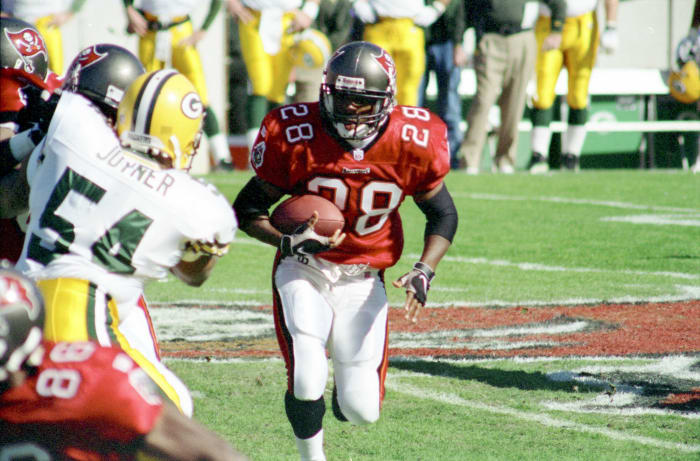
After playing at Florida State, Dunn got to start his NFL career with the Tampa Bay Buccaneers. Undersized but speedy, Dunn is remembered for being the “lightning” to Mike Alstott’s “thunder,” but Dunn delivered. He ran for 978 yards and added 462 yards receiving for the Bucs. A three-time Pro Bowler, Dunn was 14th in all-purpose yards when he retired, an impressive feat.
1998: Randy Moss

Soon, we will be at the end of running backs dominating this award, so Moss is the last of the receivers who provide a respite amid a series of rushers winning Offensive Rookie of the Year. If you were around in 1998, you don’t need to be reminded of Moss’s rookie campaign, littered with highlights for the Vikings. Moss led the NFL with 17 receiving touchdowns, one of five seasons in which he would do that. Some consider Moss the second-best receiver ever, and from his rookie season, that seemed possible.
1999: Edgerrin James
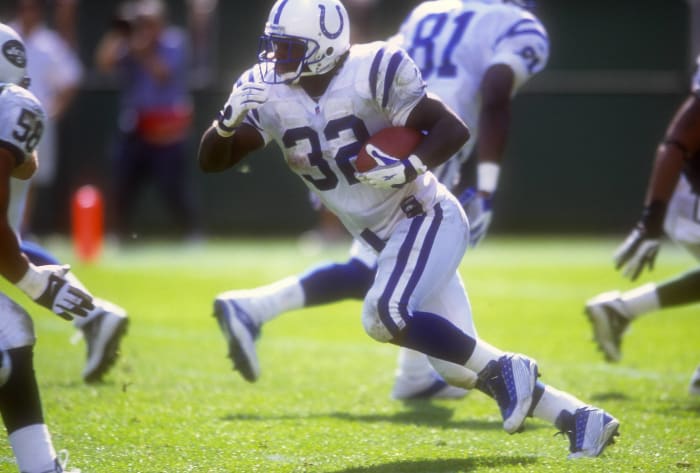
Prior to the 1999 NFL Draft, the buzz was about Ricky Williams. He was the star collegiate running back. Then, the Colts would go and draft “Edge” one pick before the Saints famously traded away their entire selection of draft picks to take Williams. Ultimately, the Colts made the right choice. James led the NFL in rushing yards in each of his first two seasons while adding over 500 receiving yards in each campaign. James would end up on the NFL’s All-2000s team, though his 1999 campaign probably greased the wheels a bit there.
2000: Mike Anderson
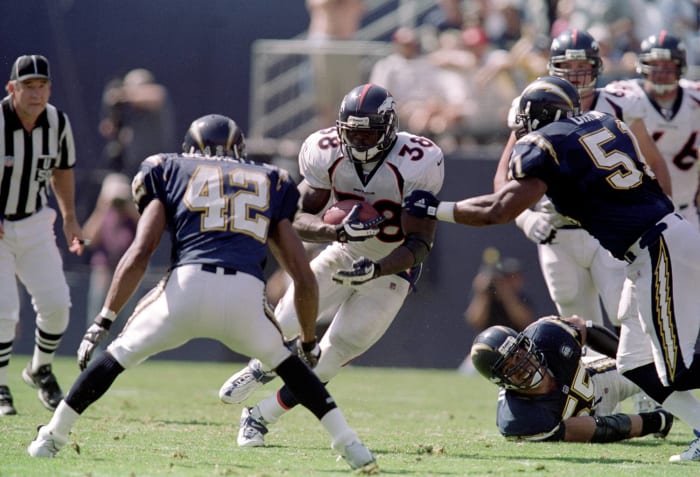
Anderson was a Marine Corps member who played JUCO ball who then spent a couple of years at Utah, which earned him a chance to be a sixth-round selection. Ah, but the Denver Broncos drafted him during the Mike Shanahan era, and as time has taught us, Shanahan was kind of a genius who could work a 1,000-yard season out of any running back. Anderson did a little more than that in 2000, though. He ran for 1,487 yards and 15 scores. Alas, injuries and an inability to rework that specific magic meant he only ever ran for over 1,000 yards one more time, in 2005. Yes, Shanahan was still his coach.
2001: Anthony Thomas

“The A-Train” was a college star at Michigan, but perhaps it should have said something that, even in 2001, he wasn’t drafted until the second round. His rookie season with the Bears was good, as he ran for 1,183 yards and seven touchdowns, even though he only played in 14 games. Those would both be career highs, though, and he only played more than 14 games once, and that was near the end of his career when he was a backup with the Bills. Thomas, it turned out, was just a guy.
2002: Clinton Portis
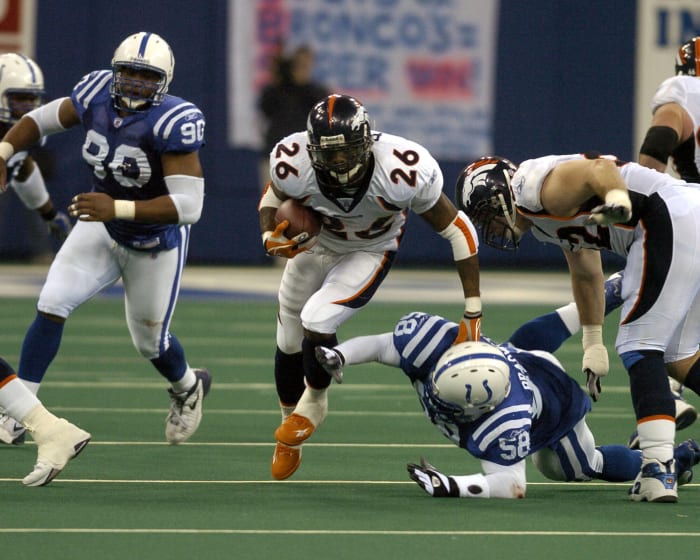
The Broncos realized Mike Anderson likely wouldn’t cut it in the long run, so they drafted Portis out of Miami. Just two years after Anderson, Portis also won Offensive Rookie of the Year. He ran for over 1,500 yards and averaged 5.5 yards per carry in each of his first two seasons. Then, the Broncos dealt him to Washington. Portis had four 1,000-yard seasons with Washington and made one Pro Bowl, so clearly, he was talented. However, away from Shanahan’s offense, he never averaged over 4.3 yards per carry again. The Broncos, meanwhile, picked up a second-round pick…and Hall of Fame cornerback Champ Bailey.
2003: Anquan Boldin
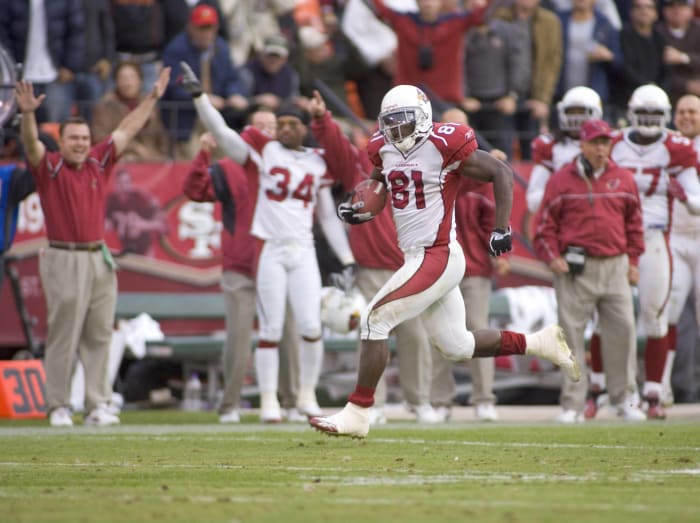
Boldin officially marks the end of the era of running backs dominating this award. A second-round pick, Boldin did not seem destined for stardom and didn’t have buzz leading into his rookie year with the Cardinals. Then, in his first NFL game, he set a rookie record with 217 receiving yards. He would end up with 101 catches for 1,377 yards and eight touchdowns, so it wasn’t just one game. It also wasn’t just one season. Boldin had four more 1,000-yard seasons with the Cardinals, and then after a few fine seasons with the Ravens, had two more campaigns over 1,000 yards with the 49ers. Turns out that the first game wasn’t a fluke but a sign that Arizona had found a diamond in the rough. Or the desert, as it were.
2004: Ben Roethlisberger
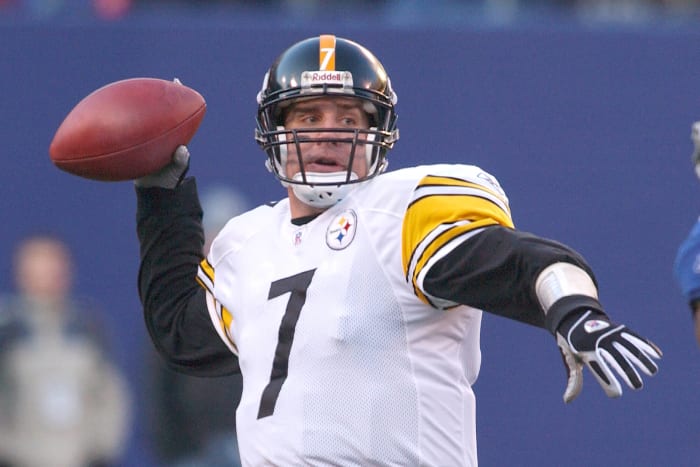
Remember Dennis Shaw? The Offensive Rookie of the Year from 1970? He was the only quarterback to win this award until Roethlisberger showed up. That’s over three decades! Now, this was probably a bit of a “winz” award. The Steelers went 13-0 in the games “Big Ben” started. His numbers, 2,621 passing yards, 17 touchdowns, and 11 picks, weren’t remarkable. However, for a rookie quarterback in 2004, those were solid stats. Of course, eventually, Roethlisberger would lead the NFL in passing yards twice and make six Pro Bowls. Also, he’d win two Super Bowls, which is notable. “Winz” people are often “ringz” people as well.
2005: Cadillac Williams
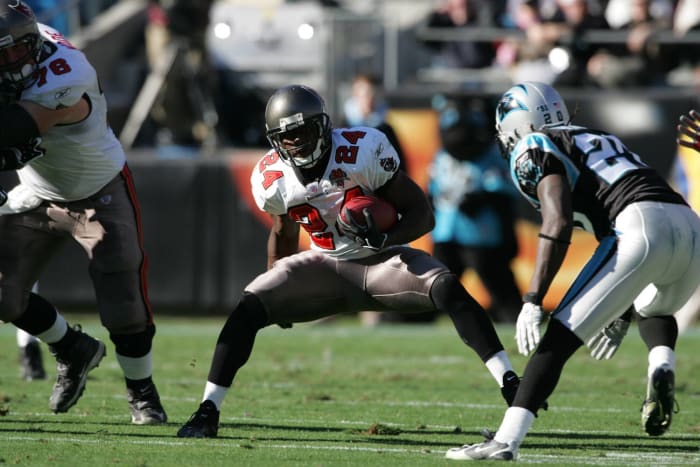
Three running backs were taken in the first five picks of the 2005 NFL Draft. That assuredly will never happen again. Williams was taken third of those three backs, behind Auburn teammate Ronnie Brown, but he was the one that won Offensive Rookie of the Year. He ran for 1,178 yards and six touchdowns for the Buccaneers. Cadillac had an injury-laden career, though, and never ran for over 1,000 yards again. Still, only in his early 40s, he’s turned to coaching and has been back at his alma mater coaching up running backs since 2019.
2006: Vince Young
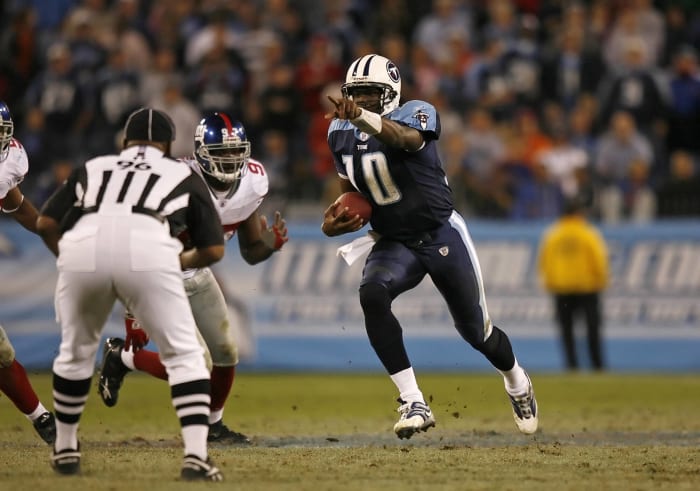
After leading the Texas Longhorns to an upset of the USC Trojans in perhaps the greatest college football game ever played, Young was taken by the Titans third overall, notably ahead of Matt Leinart of USC. As a rookie starter, Young made his name by leading Tennessee to three wins in games wherein they were trailing in the fourth quarter. He had “the will to win.” Young also had a 51.5 completion percentage with 12 passing touchdowns against 13 picks (though his 552 rushing yards and seven touchdowns were assuredly impressive). Ultimately, Young just wasn’t a viable NFL quarterback, like many former college stars. Hey, neither was Leinart.
2007: Adrian Peterson
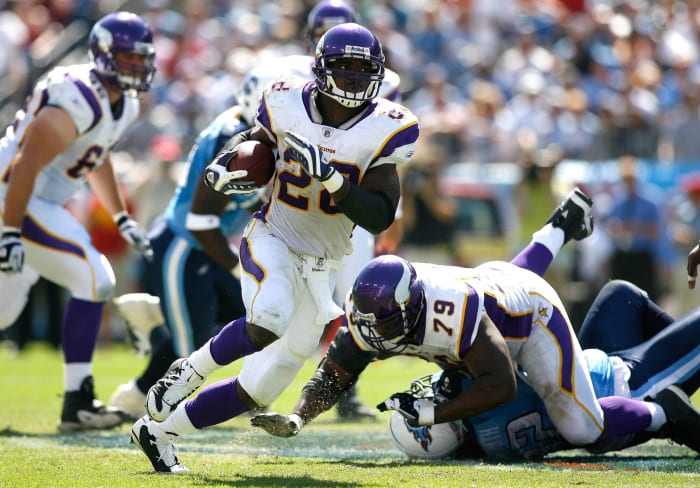
When an NFL team spends a high pick on a running back, surely part of their justification is, “What if he’s Adrian Peterson?” Indeed, Peterson proved more than worthy of being the seventh overall pick in 2007. He made seven Pro Bowls, was a first-team All-Pro four times over, and managed to win the MVP in 2012, well into the Age of the Quarterback. As to his rookie year, “AD” averaged 5.6 yards per carry and finished with 1,341 rushing yards for the Vikings.
2008: Matt Ryan
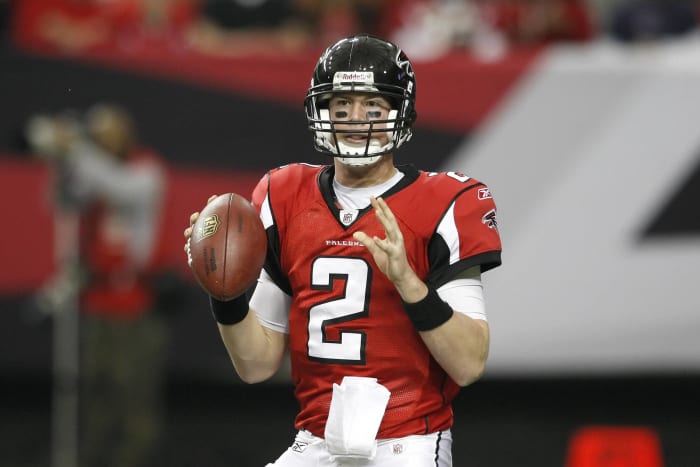
The Falcons were reeling in the wake of Michael Vick’s illegal activities and took Ryan third overall to be their new starter and, hopefully, the face of their franchise. While the Falcons (infamously) fell short of a Super Bowl win during the tenure of “Matty Ice,” he did deliver what was hoped for, including one MVP. After being taken by a flagging franchise, Ryan and the Falcons went 11-5 in 2008, and he threw for 3,440 yards with 17 touchdowns and 11 interceptions.
2009: Percy Harvin
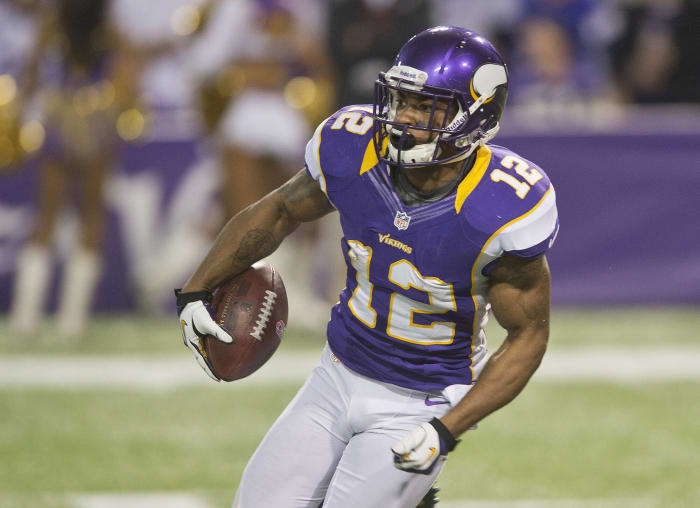
Harvin was far from the most problematic person from the Urban Meyer era of the Florida Gators, but he was, shall we say, a testing personality to deal with from time to time. On the field, he would mix in amazing plays with games where he was invisible. As a rookie for the Vikings, Harvin had 790 receiving yards and 135 rushing yards and returned two kicks for touchdowns. He did win a Super Bowl with the Seahawks in a season where he only played three total games, playoffs included, but his personal successes peaked with his Offense Rookie of the Year award.
2010: Sam Bradford
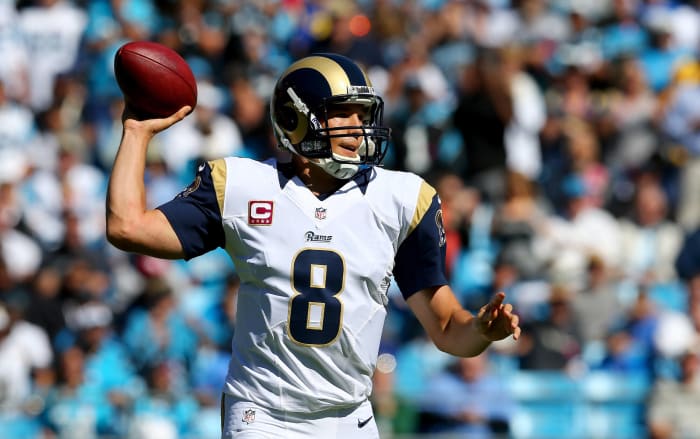
Bradford was the last quarterback taken first overall before rookie contracts were restructured. That is to say, when Bradford was drafted by the Rams, he became the highest-paid quarterback in the NFL. As a rookie, he threw the ball 590 times and finished with 3,512 yards, 18 touchdowns, and 15 interceptions for a 7-9 team. Well, from picking first overall to 7-9 is not too shabby, so that likely played a role in this win. Bradford did have one good season with the Rams...and a pretty good one with the Eagles…and a good one with the Vikings, but that’s about it. Not quite a bust, but not quite a success, either.
2011: Cam Newton
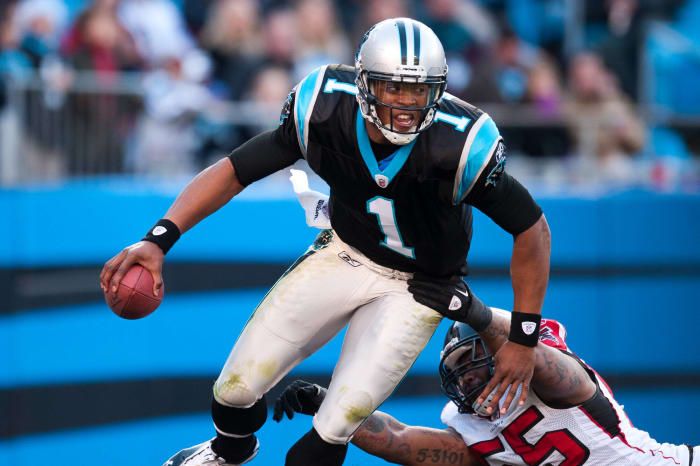
Newton was a one-season wonder in college, but it was enough for the Panthers to draft him first overall. It paid off. He threw for 4,051 yards with 21 touchdowns and 17 picks, but that’s just the appetizer. Newton also ran for 706 yards and 14 touchdowns, the latter a record for a quarterback. In fact, when Newton retired, his 75 rushing scores were also an NFL record. He won an MVP and did it with a singular style for the position. A memorable player, to be sure.
2012: Robert Griffin III
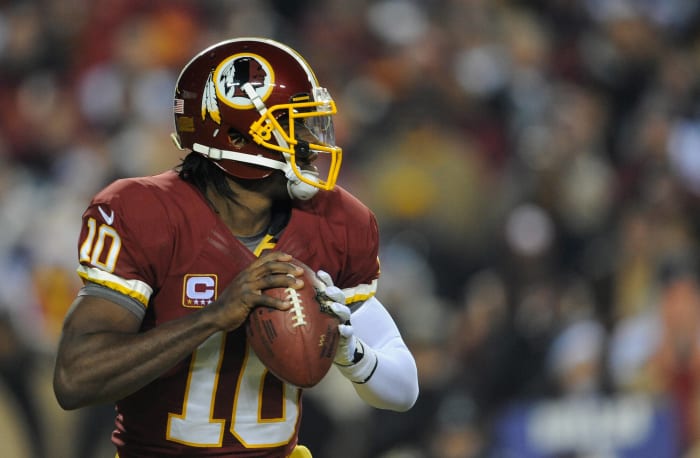
Alas, we’ll never know what RGIII could have been. He won the Heisman at Baylor and then was a star for Washington as a rookie. He threw 20 touchdowns against only five picks while adding 815 yards and seven touchdowns on the ground (we will admit his 12 fumbles are quite bad). Griffin was dynamic as a rookie, but you likely know the rest. He tore up his knee in the playoffs as a rookie, and while RGIII played in 2013, he wasn’t quite the same. A bad ankle injury in 2014 effectively ended his viable years as an NFL player. It seems like there’s a good chance a whole generation will know RGIII solely as an announcer, never knowing of his Heisman or his exciting rookie campaign.
2013: Eddie Lacy
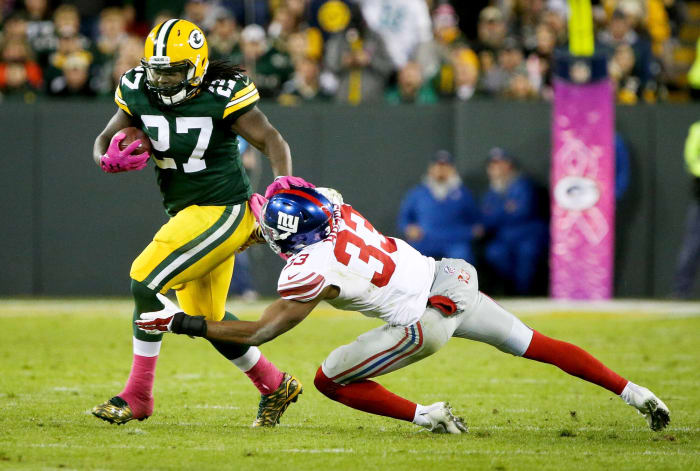
Oh yeah, running backs exist! After Peterson, another back didn’t win until Lacy in 2013. The churn of the modern running back is a story Lacy is quite familiar with. He ran for 1,178 yards and 11 touchdowns as a rookie for the Packers. Lacy ran for over 1,000 yards the next season. By 2016, he was forgotten about even before getting injured. The Packers let him walk, he signed a one-year deal with the Seahawks, he got 69 carries total, and his NFL career was over.
2014: Odell Beckham Jr.

That catch. Beckham Jr. likely earned his Offensive Rookie of the Year award off of that catch alone. That was only one highlight in a great season for the Giants. OBJ had 91 catches for 1,305 yards and 12 touchdowns as a rookie. His first three campaigns were great, and he’s had a couple of good seasons since. However, Beckham Jr. has been scuffling and dealing with injuries for a bit, and it seems unlikely he will ever be a star again.
2015: Todd Gurley

Gurley became a star…and a cautionary tale. When teams balk at giving big contracts to running backs, they point to Gurley and the Rams. He ran for 1,106 yards and 10 touchdowns as a rookie. Gurley won Offensive Player of the Year in 2017 and led the NFL in rushing touchdowns in 2017 and 2018. Then, in 2019, he was merely decent. In 2020, he was on the Falcons. By 2021, he was out of the NFL. A true star running back had a six-season career. That’s the modern NFL.
2016: Dak Prescott
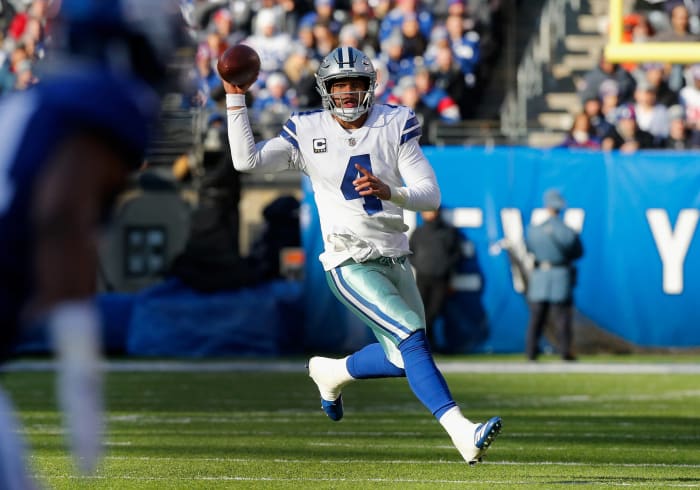
You don’t typically expect a fourth-round quarterback to play for you, well, ever. You definitely don’t expect them to start as a rookie, especially if you are the Dallas Cowboys. Well, Prescott wasn’t supposed to start. He was buried on the depth chart. Then, Kellen Moore broke his leg. Then, the Cowboys couldn’t complete a trade for Josh McCown. When Tony Romo suffered a serious injury in the preseason, the gig was suddenly Prescott’s. He flourished. Dak started the entire season, and he threw for 3,667 yards with 23 touchdowns and only four picks. Prescott also added six rushing scores. Oh, and the Cowboys finished 13-3. Prescott has remained the starter in Dallas, and while he gets a lot of harsh criticism — he is the Cowboys quarterback, after all — he’s proved to be no fluke. The guy has already locked up no worse than a “Hall of Very Good” career.
2017: Alvin Kamara
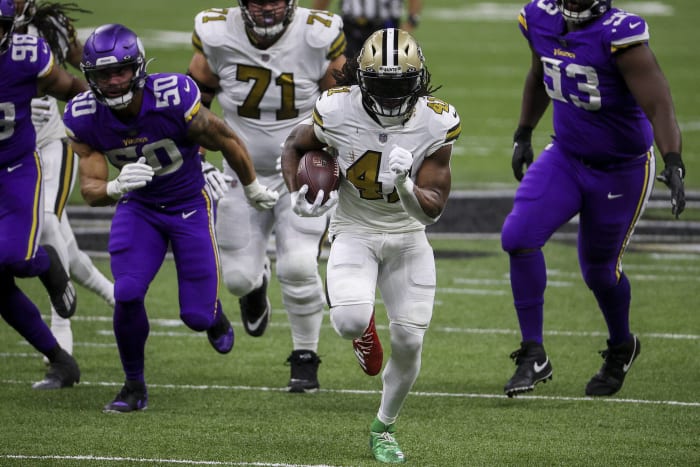
Mid-round surprises are less, well, surprising with running backs, but Kamara still turned heads as a rookie. A third-round pick, Kamara was a second-team All-Pro as a rookie, much less Offensive Rookie of the Year. He only ran for 728 yards as a rookie but averaged a whopping 6.1 yards per carry. Plus, he added 81 catches for 826 yards through the air. In fact, Kamara had over 80 catches in each of his first four seasons, earning him a reputation as a real dual-threat.
2018: Saquon Barkley
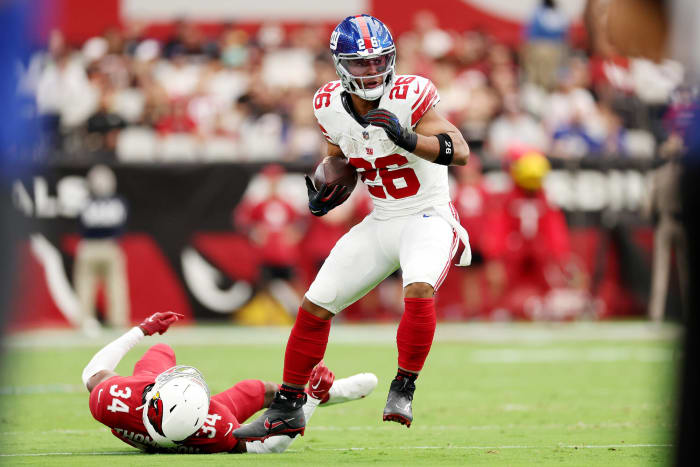
We won’t defend former Giants GM Dave Gettleman taking Barkley second overall. In the 2018 version of the NFL, that doesn’t fly. That said, Barkley was absolutely dynamic as a rookie. He ran for 1,307 yards and 11 touchdowns and added 91 catches for 721 yards and four scores for good measure. That included five touchdowns of over 50 yards. Barkley would make his second Pro Bowl in 2022, but after a few years lost to injuries in the mix. One of the reasons teams are wary of drafting running backs so high.
2019: Kyler Murray

The NFL’s evolution flipped the script for Murray during the time he was in college. At one point, he seemed primed to have a future in MLB after being a first-round pick of the Oakland Athletics. Then, he won a Heisman, everybody got super into spread offenses and all things Sean McVay, and Murray was drafted first overall in the NFL Draft. Sorry, A’s. The question is whether that was a good decision for the Arizona Cardinals. Yes, he won Offensive Rookie of the Year, even while taking a league-high 48 sacks, but highly-sacked rookies often learn bad habits, especially when coached by overmatched individuals like Kliff Kingsbury. Murray was a Pro Bowler in 2020 and 2021. These days, there is Pro Bowler inflation, but by 2022, many fans, football writers, and pundits wondered if he'd hit his ceiling. Injured to start 2023, there is a belief that if the Cardinals draft highly enough in 2024, they will take a quarterback to replace Murray.
2020: Justin Herbert
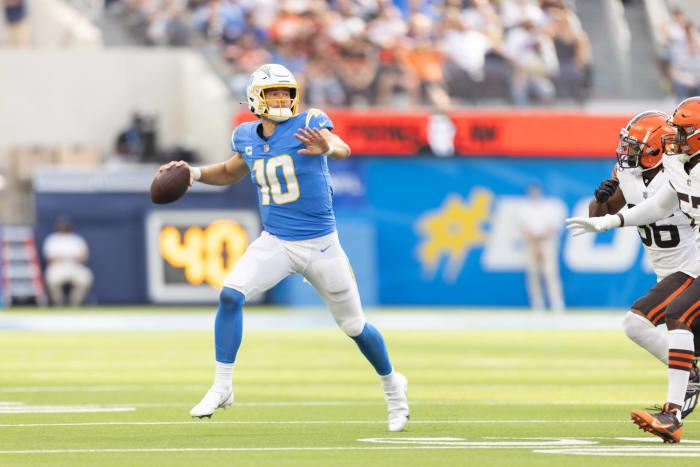
There is no talk of Herbert being replaced in Los Angeles. The Chargers have reimagined the painful loss time and time again, but Herbert has done his job under center. As a rookie, he threw for 31 touchdowns against 10 picks, and while he didn't run a ton, he added five scores on the ground. Herbert is setting a lot of quarterback records, and all he needs to do now is drag his team to playoff success. Good luck.
2021: Ja’Marr Chase
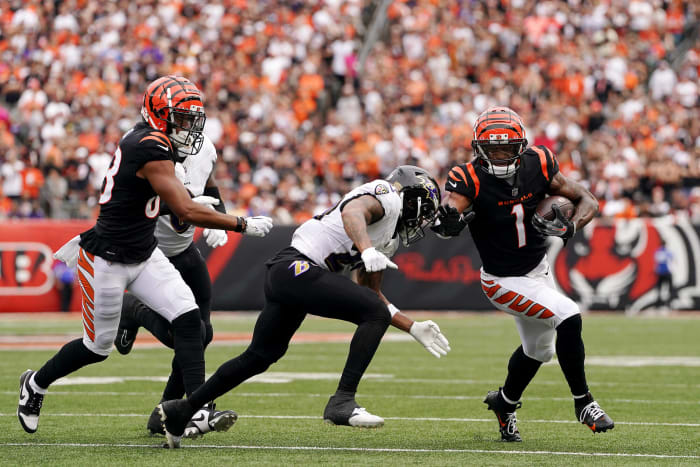
Even though Chase sat out his last college season (it was COVID times, so understandable), the Bengals made him the fifth overall pick in 2021. Immediately, the receiver showed us why. He set a new record for receiving yards by a rookie with 266, ultimately finishing with 1,455 yards and 13 touchdowns, though now in 17 games. Even so, that is instant stardom.
2022: Garrett Wilson

Chase had a great year, but he was catching balls from Joe Burrow. Wilson won Offensive Rookie of the Year catching passes from the bleakest selection of quarterbacks imaginable. Playing for the Jets, Wilson tallied 83 catches for 1,103 yards and four touchdowns. He squeezed out fellow receiver Chris Olave for the award. Perhaps because the Jets’ season included the names “Joe Flacco” and “Chris Streveler” under center?
2023: C.J. Stroud

Stroud was a Heisman finalist twice, and the second-overall pick in the 2023 NFL Draft behind fellow quarterback Bryce Young. Apparently Stroud got tired of being a bridesmaid. He and new head coach DeMeco Ryans both played key roles in turning around the Texans. As in, Stroud and company went from picking second to winning the AFC South. Not only did the Ohio State alum win Offensive Rookie of the Year in a walk, for a while he was getting down-ballot MVP buzz. The future feels bright in Houston.
Chris Morgan is a sports and pop culture writer and the author of the books The Comic Galaxy of Mystery Science Theater 3000 and The Ash Heap of History. You can follow him on Twitter @ChrisXMorgan.
More must-reads:
- NFL reporter predicts Cowboys' plan for QB Dak Prescott
- If Lions HC Dan Campbell's assessment of WR is accurate it could mean trouble for opponents
- The 'Most touchdowns in a season for every NFL franchise' quiz
Breaking News
Customize Your Newsletter
 +
+
Get the latest news and rumors, customized to your favorite sports and teams. Emailed daily. Always free!
Use of this website (including any and all parts and
components) constitutes your acceptance of these
Terms of Service and Privacy Policy.

